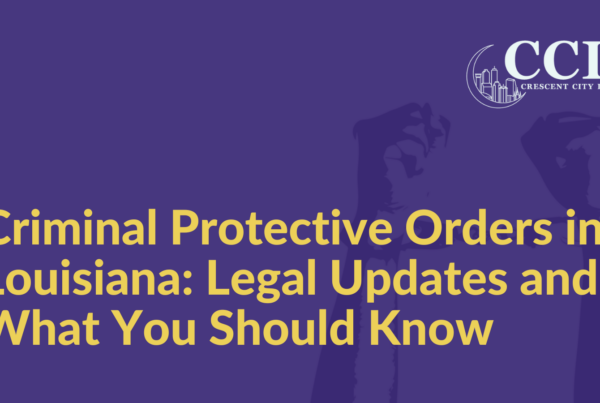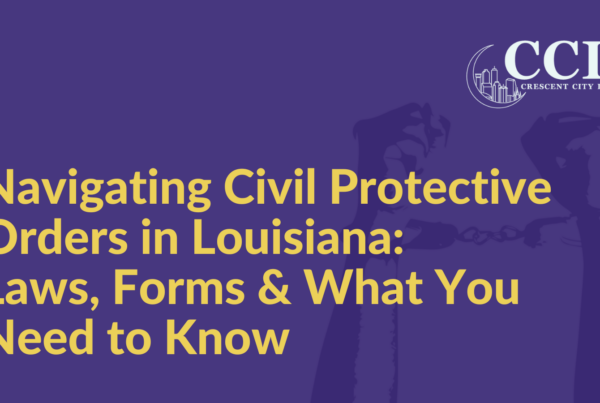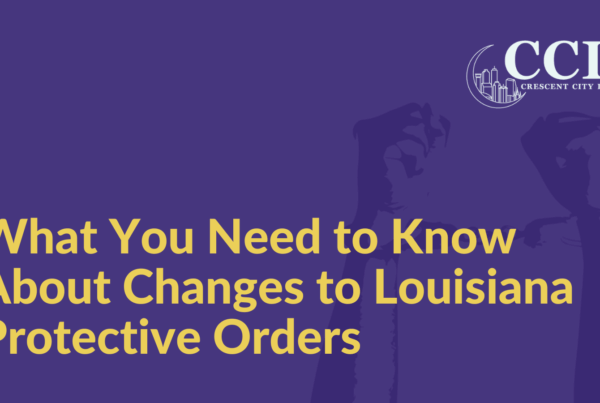When you’re arrested for battery on a dating partner, it can feel like your entire world shifts in an instant. For members of the LGBTQ+ community, the legal process can be even more disorienting, because you’re not only navigating criminal charges, but also concerns about being judged unfairly due to your identity or the nature of your relationship.
At Crescent City Law, we understand that behind every charge is a human story. Led by New Orleans criminal defense attorney John Radziewicz, we’re here to help you face these charges head-on, with dignity, clarity, and the support you deserve.
What Is Battery on a Dating Partner in Louisiana?
Under Louisiana Revised Statute §14:34.9, battery on a dating partner refers to intentionally using force or violence against someone with whom you have or had a romantic or intimate relationship.
The law defines a “dating partner” as someone who is or was involved in an intimate or romantic relationship with the accused. This includes:
- Same-sex partners
- Short-term or casual romantic relationships
- Partners not living together
- Former partners or exes
This statute makes it clear that all romantic relationships are treated equally under Louisiana law, regardless of gender, sexual orientation, or whether the relationship was long-term or brief.
What Qualifies as Battery?
Contrary to what some believe, battery doesn’t require visible injuries or dramatic violence. In fact, any intentional physical contact that causes harm or offense may qualify as battery. This can include:
- Hitting, slapping, or punching
- Pushing or shoving during an argument
- Throwing objects or using physical intimidation
- Grabbing someone’s arm or restraining them
Even if the other person didn’t need medical care, you can still be charged. And once the police are involved, you don’t have to be guilty for the case to move forward as prosecutors can pursue charges even if the alleged victim wants to drop them.
Is Battery on a Dating Partner a Felony or Misdemeanor?
The answer depends on the facts of your case, but generally, first-time offenses are charged as misdemeanors, while second or subsequent offenses, or cases involving serious injury or the use of a weapon, may be charged as felonies.
If convicted, penalties can include:
- Jail time
- Mandatory counseling or anger management
- Fines
- Loss of gun rights
- Court-ordered protective orders restricting your contact with the other person
Repeat offenses, prior convictions, or evidence of bodily harm significantly raise the stakes. That’s why early legal intervention matters.
How Does This Affect LGBTQ+ Defendants?
Unfortunately, members of the LGBTQ+ community may face added bias or misunderstanding in domestic violence cases. Officers, judges, or prosecutors might:
- Misinterpret relationship dynamics
- Fail to recognize emotional or verbal abuse patterns in same-sex relationships
- Assume physical size or gender presentation determines the “aggressor”
At Crescent City Law, we know these dynamics all too well. We work to counter bias in the system, protect your rights, and ensure that your identity is never used against you in court.
What Happens After You’re Arrested?
Once arrested, you may be taken into custody and booked. A protective order could be issued that restricts your ability to return home, even if you share a residence with the alleged victim. Then, you’ll be scheduled for an arraignment, where you’ll formally hear the charges and enter a plea.
Depending on how you plead—not guilty, guilty, or no contest—the case may proceed to:
- Pretrial hearings and motions
- Negotiations with prosecutors
- A possible trial
The entire process is governed by specific laws and timelines, including Louisiana Code of Criminal Procedure Article 701, which outlines how long the state has to prosecute your case.
What Defenses Are Available?
Every case is different. But common legal defenses may include:
- Self-defense or mutual physical contact
- False accusations made out of anger, revenge, or fear
- Lack of intent to harm
- Insufficient evidence or conflicting witness testimony
Your defense strategy should reflect the reality of your relationship, not a cookie-cutter legal approach. At Crescent City Law, our experienced legal team takes the time to understand the full picture and build a case that honors your story.
Louisiana law imposes a statute of limitations on domestic battery charges, allowing up to two years to prosecute misdemeanor charges and up to four years for felony charges. This timeframe begins on the date of the alleged offense.
However, it’s important not to delay, seeking legal help as early as possible can greatly improve your ability to protect your rights and build a solid defense.
Your Story Deserves to Be Heard—Contact Our Assault & Battery Lawyers at Crescent City Law Today
If you’ve been charged with battery on a dating partner, whether your relationship is LGBTQ+ or not, you deserve legal guidance that’s thoughtful, thorough, and free from judgment.
Contact us today at 504-264-9492 to schedule an initial consultation with our team. We’ll help you understand your options and fight for the best possible outcome.
FAQs
1. Does Louisiana law treat LGBTQ+ dating relationships differently in battery cases?
No. Louisiana law explicitly recognizes same-sex and LGBTQ+ relationships under the dating partner statute. The law applies equally to all romantic or intimate partners, regardless of gender or sexual orientation.
2. Can I be charged with battery on a dating partner even if there are no visible injuries?
Yes. Battery doesn’t require serious injury. Any intentional physical contact that causes harm or offense, such as grabbing, shoving, or slapping, can result in charges.
3. What penalties could I face if convicted?
Penalties vary depending on the circumstances. A first offense may be a misdemeanor with fines, probation, or counseling requirements. Repeat offenses or cases involving weapons or serious harm can result in felony charges and jail time.
4. How do protective orders affect LGBTQ+ defendants?
A protective order may bar you from returning home or contacting your partner, even if you share a residence. Violating the order can result in additional charges and penalties, so compliance is critical.
5. What if the alleged victim wants to drop the charges?
Even if the other person asks to dismiss the case, prosecutors can still move forward. Domestic violence charges are treated as a public safety matter in Louisiana, and the decision to prosecute is in the hands of the state, not the alleged victim.
6. What should I do after being arrested for battery on a dating partner?
Seek legal counsel immediately. Early intervention can help protect your rights, prevent mistakes, and build a strong defense. Crescent City Law is here to guide you through each step of the process.






